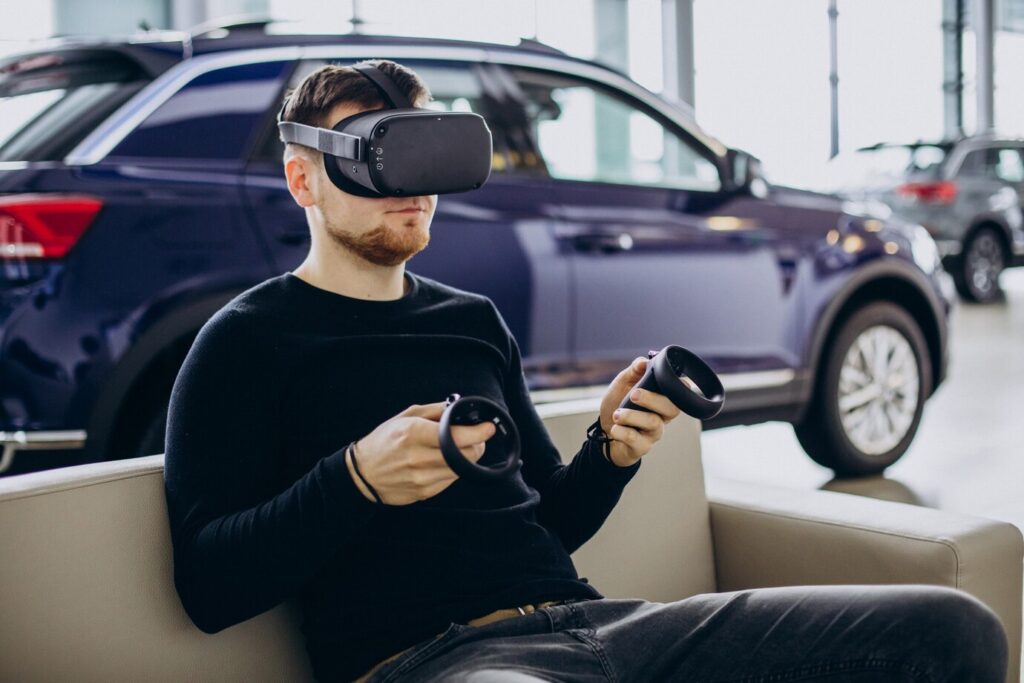Experience Virtual Tours | Augmented Reality Car Dealerships
The auto business has changed significantly with the rise of augmented reality (AR) car dealerships, reshaping how vehicles are marketed and sold. This shift has moved beyond traditional showrooms, allowing consumers to explore and interact with cars from the convenience of their screens. AR technology offers unparalleled convenience, customization, and flexibility, democratizing access to vehicle options and streamlining the car buying process. This article delves into the evolution of AR car sales, examining its implications for consumers and dealerships.
From virtual showrooms to interactive test drives, AR technology enhances the car buying experience, offering consumers unprecedented convenience and engagement. As the automotive industry embraces this digital revolution, we explore the benefits, challenges, and future implications of augmented reality car sales, highlighting the open doors for advancement and development in an undeniably computerized marketplace.

Customization at Your Fingertips
With AR, consumers enjoy enhanced customization options, allowing them to personalize their dream car virtually. From selecting paint colours to interior features, the immersive nature of augmented reality empowers buyers to tailor every aspect of their vehicle to their preferences, fostering a more profound sense of ownership and satisfaction.
Test Drive Anywhere, Anytime
Interactive test drives through augmented reality allow consumers to experience the road from the comfort of their own space. By simulating real-world driving scenarios, AR technology provides invaluable insights into a vehicle’s performance and handling, enabling informed purchasing decisions without needing physical test drives.
Seamlessly Integrated Experience
The integration of augmented reality bridges the gap between online and offline car shopping, creating a seamless and cohesive experience for consumers. Whether browsing on a website, mobile app, or in-person at a dealership, AR technology ensures continuity and consistency throughout the car buying journey, enhancing overall satisfaction and engagement.
Benefits for Consumers
Convenience Redefined
The convenience of augmented reality car dealerships cannot be overstated. By bringing the showroom directly to consumers’ screens, AR eliminates the need for time-consuming visits to multiple dealerships, saving valuable time and energy.
Informed Decision-Making
AR empowers consumers with comprehensive information about vehicle options, features, and pricing, enabling them to make informed decisions confidently. Through virtual exploration and customization, buyers gain a deeper understanding of their preferences and priorities, leading to more satisfying purchase outcomes.
Enhanced Accessibility
For consumers with mobility limitations or geographical constraints, augmented reality car dealerships offer newfound accessibility to the car buying process. By breaking down barriers to entry, AR technology guarantees that everybody can take part in the experience, regardless of physical location or mobility challenges.
Reduced Pressure and Stress
The immersive nature of augmented reality provides consumers with a pressure-free environment to explore and interact with vehicles at their own pace. Without sales personnel or time constraints, buyers can make decisions without feeling rushed or overwhelmed, prompting a more loose and charming shopping experience.
Advantages for Dealerships
Expanded Reach and Market Penetration
Augmented reality car dealerships offer an opportunity to expand their reach beyond traditional boundaries and tap into new markets. By leveraging digital platforms and virtual showrooms, dealerships can connect with consumers across geographical regions, increasing market penetration and driving sales growth.
Cost-Effective Solutions
Implementing augmented reality technology can significantly reduce overhead costs for maintaining physical showrooms and inventory. By transitioning to virtual environments, dealerships can streamline operations, optimize inventory management, and allot assets more proficiently, bringing about cost investment funds and further developing productivity.
Enhanced Customer Engagement
AR car dealerships facilitate more profound customer engagement and interaction, fostering stronger relationships between dealerships and buyers. Through personalized virtual experiences and interactive features, dealerships can create memorable and impactful moments that resonate with consumers, increasing brand loyalty and repeat business.
Data-Driven Insights
By leveraging augmented reality technology, dealerships get close enough to important information and examinations that can illuminate key independent direction and marketing initiatives. From customer preferences to browsing behaviours, AR platforms generate actionable insights that enable dealerships to optimize their offerings, refine their targeting strategies, and stay ahead of market trends.
Future Implications
Continued Innovation and Advancement
The rise of augmented reality car dealerships signals a broader trend towards digital transformation within the car business. As innovation advances and improves, we look forward to further advancements in AR applications, from enhanced visualization tools to immersive virtual experiences, reshaping the future of car buying in unprecedented ways.
Shift in Consumer Expectations
The widespread adoption of augmented reality technology is changing consumer expectations and preferences regarding the car buying experience. As consumers become accustomed to the convenience and flexibility of virtual showrooms, they will increasingly demand similar levels of innovation and digital integration from dealerships, driving industry-wide shifts towards AR-enabled solutions.
Impact on Traditional Dealerships
The proliferation of augmented reality car dealerships poses challenges and opportunities for traditional brick-and-mortar dealerships. While some may struggle to adapt to the digital landscape, others will embrace augmented reality to remain cutthroat and pertinent in a developing business sector. Those who successfully integrate AR technology into their business models benefit from increased efficiency, customer satisfaction, and market share.
Regulatory and Ethical Considerations
As expanded reality becomes more predominant in the automotive industry, regulators and policymakers must address various legal, ethical, and privacy concerns associated with its use. From data privacy to consumer protection, numerous implications require careful deliberation and proactive measures to ensure AR car dealerships operate ethically and responsibly.
Overcoming Challenges
Technical Limitations and Implementation Barriers
Despite the promise of augmented reality technology, dealerships must address significant technical challenges and implementation barriers. From compatibility issues to hardware requirements, ensuring a seamless and user-friendly AR experience requires careful planning, investment, and expertise. Overcoming these challenges will be essential for maximizing the potential of AR car dealerships and delivering value to consumers.
User Adoption and Education
Another obstacle to overcome is user adoption and education surrounding augmented reality technology. While younger generations may be more familiar with AR applications, older demographics may require additional support and guidance to embrace this new way of car shopping fully. Dealerships must invest in education and training initiatives to confidently engage buyers with the information and abilities to navigate virtual showrooms.
Security and Privacy Concerns
Security and privacy concerns present additional challenges for augmented reality car dealerships. From data breaches to unauthorized access, the digital nature of AR platforms introduces new risks that must be addressed through robust cybersecurity measures and privacy safeguards. Building trust and transparency with consumers will ensure AR-enabled car sales’ long-term success and sustainability.
Market Trends and Opportunities
Growth of Virtual Reality (VR) Integration
In addition to augmented reality, we are witnessing a growing trend towards virtual reality (VR) integration in the automotive industry. VR innovation offers vivid and intelligent encounters that complement AR applications, providing consumers with even more options for exploring and customizing vehicles. Dealerships that embrace AR and VR stand to acquire an upper hand in an undeniably computerized marketplace.
Rise of Online-Only Dealerships
The rise of augmented reality car dealerships has paved the way for a new breed of online-only dealerships that operate exclusively in virtual environments. By eliminating the need for physical showrooms, these digital-first dealerships can reduce overhead costs, streamline operations, and pass on savings to consumers through lower prices and enhanced services.
Integration with E-Commerce Platforms
As e-commerce continues gaining traction in the automotive industry, we expect greater integration between augmented reality car dealerships and online retail platforms. By seamlessly connecting virtual showrooms with e-commerce functionalities, dealerships can facilitate end-to-end car buying experiences, from browsing and customization to financing and delivery, all within a single digital ecosystem.
The Future of Augmented Reality Car Sales
Enhanced Personalization and Interactivity
Looking ahead, the future of augmented reality car sales promises even greater levels of personalization and interactivity for consumers. Advancements in AR technology, such as real-time 3D modelling and artificial intelligence, will enable more immersive and lifelike virtual experiences, allowing buyers to interact with vehicles in unprecedented ways and make more informed purchasing decisions.
Expansion into Other Industries
Beyond the automotive sector, augmented reality technology holds immense potential for revolutionizing sales and marketing across various industries. From real estate to retail, AR-enabled experiences can enhance customer engagement, streamline transactions, and drive business growth in new and exciting ways. As the innovation develops and becomes more available, we expect widespread adoption and integration across diverse sectors.
Sustainable and Eco-Friendly Solutions
Through worldwide endeavours to advance manageability and reduce environmental impact, augmented reality car sales offer eco-friendly alternatives to traditional showroom-based shopping. AR technology aligns with economic and strategic policies by limiting the requirement for actual travel and diminishing carbon emissions associated with transportation. It adds to a greener, more environmentally conscious future.
Conclusion
In conclusion, augmented reality (AR) car dealerships represent a pivotal evolution in the automotive industry, offering consumers unparalleled convenience, customization, and engagement. Despite the challenges and obstacles that accompany this technological shift, the potential for AR to redefine the car buying experience and drive innovation is undeniable. By embracing this digital revolution and leveraging its capabilities to their fullest extent, consumers and dealerships can open new doors for development, effectiveness, and achievement in an increasingly digital world.
As AR innovation proceeds to advance and improve, we can expect much more noteworthy degrees of personalization, interactivity, and sustainability in the future of car sales. With continued investment, innovation, and collaboration, AR car dealerships have the potential to revolutionize not only the automotive industry but also sales and marketing across various sectors, ushering in a new era of convenience, accessibility, and innovation for all stakeholders involved.



